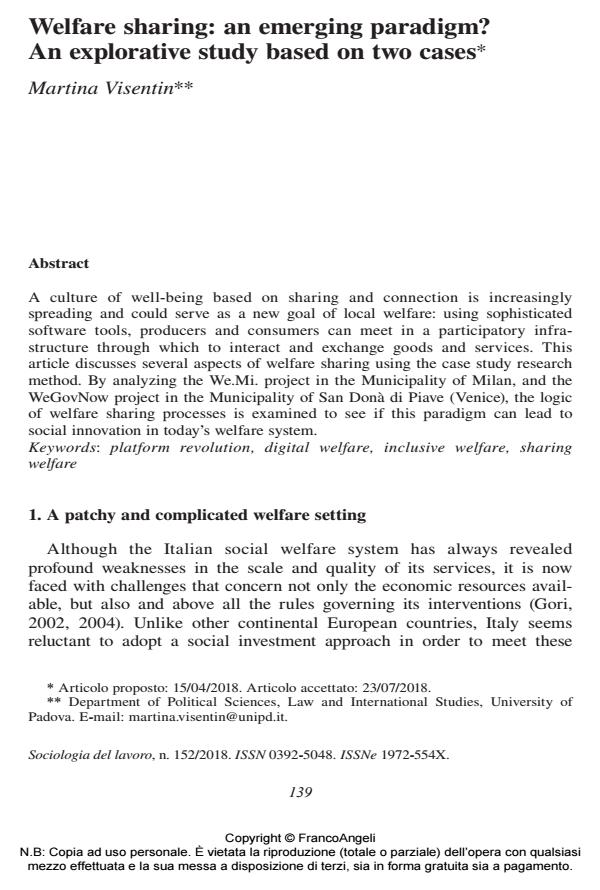Welfare sharing: an emerging paradigm? An explorative study based on two cases
Titolo Rivista SOCIOLOGIA DEL LAVORO
Autori/Curatori Martina Visentin
Anno di pubblicazione 2018 Fascicolo 2018/152
Lingua Inglese Numero pagine 16 P. 139-154 Dimensione file 113 KB
DOI 10.3280/SL2018-152008
Il DOI è il codice a barre della proprietà intellettuale: per saperne di più
clicca qui
Qui sotto puoi vedere in anteprima la prima pagina di questo articolo.
Se questo articolo ti interessa, lo puoi acquistare (e scaricare in formato pdf) seguendo le facili indicazioni per acquistare il download credit. Acquista Download Credits per scaricare questo Articolo in formato PDF

FrancoAngeli è membro della Publishers International Linking Association, Inc (PILA), associazione indipendente e non profit per facilitare (attraverso i servizi tecnologici implementati da CrossRef.org) l’accesso degli studiosi ai contenuti digitali nelle pubblicazioni professionali e scientifiche.
A culture of well-being based on sharing and connection is increasingly spreading and could serve as a new goal of local welfare: using sophisticated software tools, producers and consumers can meet in a participatory infra¬structure through which to interact and exchange goods and services. This article discusses several aspects of welfare sharing using the case study research method. By analyzing the We.Mi. project in the Municipality of Milan, and the WeGovNow project in the Municipality of San Donà di Piave (Venice), the logic of welfare sharing processes is examined to see if this paradigm can lead to social innovation in today’s welfare system.
L’obiettivo di questo contributo - attraverso la presentazione di due casi, il Progetto WeGovNow e il Progetto WeMi - vuole offrire una riflessione critica sull’emergere di un nuovo paradigma di welfare basato sulla cosiddetta Platform Revolution. I progetti presi in esame offrono le coordinate alternative di accesso ai servizi che si possono creare, rispetto al welfare tradizionale, nell’utilizzo di modalità che in parte integrano, in parte sostituiscono le modalità tradizionali di distribuzione e fruizione dei servizi di welfare.
Parole chiave:Platform revolution, welfare digitale, welfare collaborativo, sharing welfare
- Digital divide, e-government and trust in public service: The key role of education Diego Mesa, in Frontiers in Sociology 1140416/2023
DOI: 10.3389/fsoc.2023.1140416 - Exploring Social Innovation (SI) Within the Research Contexts of Higher Education, Healthcare, and Welfare Services—A Scoping Review Anne Marie Lunde Husebø, Marianne Storm, Atle Ødegård, Charlotte Wegener, Marie Aakjær, Anne Lyngby Pedersen, Maja Boelsmand Østergaard, Elisabeth Willumsen, in Nordic Journal of Social Research /2021 pp.72
DOI: 10.7577/njsr.3455
Martina Visentin, Welfare sharing: an emerging paradigm? An explorative study based on two cases in "SOCIOLOGIA DEL LAVORO " 152/2018, pp 139-154, DOI: 10.3280/SL2018-152008